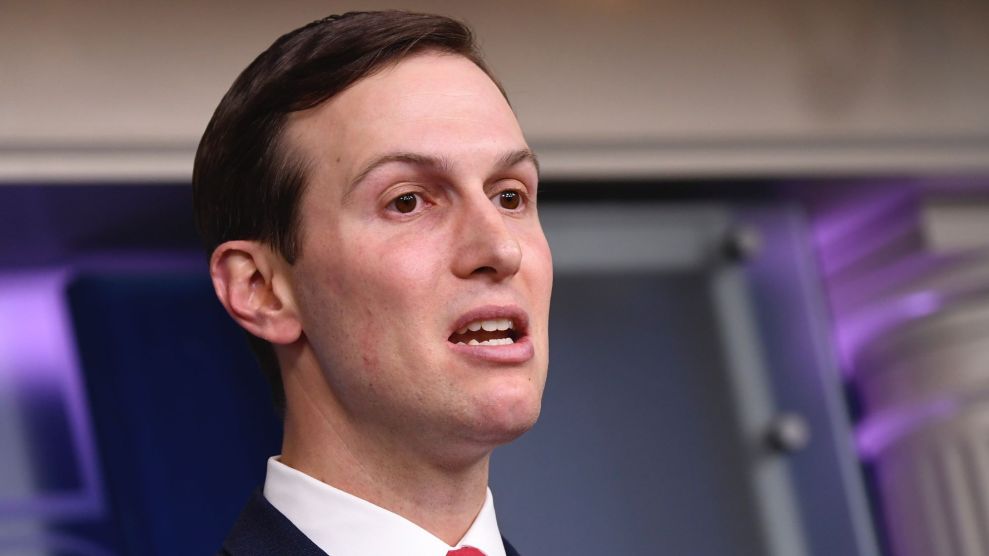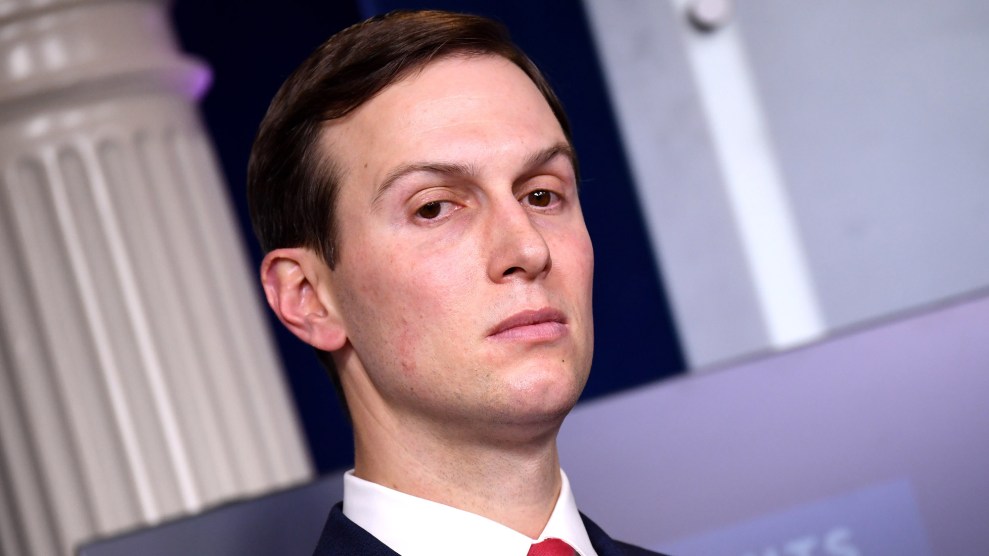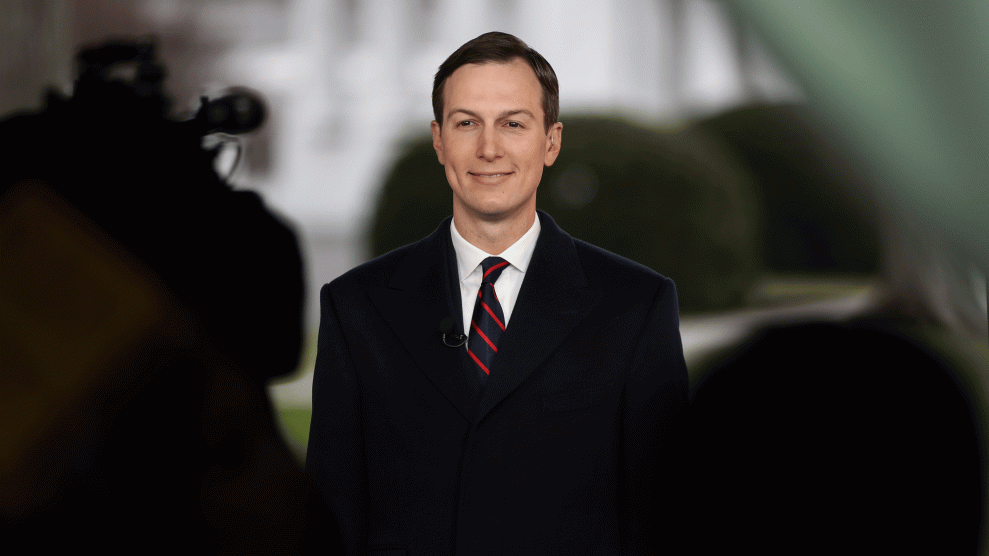
Kevin Dietsch/CNP via Zuma
Last year, private equity firms spent tens of millions to to defeat bipartisan legislation reining in surprise medical bills that can send unsuspecting patients into debt. In December, Congress buckled to the industry’s pressure and failed to limit predatory billing practices of many institutional health care investors—especially private equity firms, which have aggressively moved into the health care space over the last decade.
Welsh, Carson, Anderson & Stowe—one such private equity firm that has generated big investor returns by following the industry playbook of buying up health care practices, loading them with debt, and charging patients more—controls companies that spent hundreds of thousands lobbying against the bill and helped fund a coalition of private equity-backed medical groups that spent $4 million to block the legislation. And last month, one of the firm’s top executives joined a shadow task force convened by Jared Kushner to help run the Trump administration’s response to the coronavirus pandemic.
He’s in good company. When Kushner, the president’s son-in-law, assembled the group, he did not turn to experts in crisis management or public health. Instead, he enlisted people with experience in the business of health care—not necessarily medical experts, but particularly those who worked on finance side and were adept at making money off the health care industry. Some who were invited to join from inside the government’s ranks were former investors and entrepreneurs in the health space, including a former roommate of Kushner’s. But members of the shadow working group who come from outside government work at or run companies that have a clear financial stake in how the government handles the crisis and doles out contracts, spending, and bailout funding.
Because of the way the group has been assembled and run, the outsiders, unlike government employees, have not had to disclose any such potential conflicts, submit to ethics determinations about recusals, nor to divest from any financial arrangements that could influence their decisions. Moreover, because Kushner’s group is operating on private phones and email accounts without regard for federal transparency requirements governing advisory committees, there’s less insight into whether or not they are using their positions to make money for themselves or their companies.
“There are serious questions about how the Trump and Kushner families use the presidency to benefit themselves,” says Jordan Libowitz, a spokesman for Citizens for Responsibility and Ethics in Washington, a watchdog group whose experts say Kushner’s shadow group is violating federal record-keeping and transparency laws. “We don’t know how involved family business ties are to any of this. We don’t know all the members of the task force or who they’re talking to. We don’t know how people are pushing their own financial interests.”
“That isn’t to say that Jared’s doing something nefarious here,” Libowitz adds. “It is to say that if he were, this is how he would do it.”
The secrecy and clear conflicts of interest are in line with the group’s overall operations. The first report of its existence, published by the Washington Post in mid March, revealed that members were working out of offices at the Department of Health and Human Services headquarters, including representatives from UPS and FedEx. Kushner’s team has significant influence inside the official coronavirus task force run by Vice President Mike Pence, including a subgroup working on supply chain issues. According to NBC News, FedEx has been chartered, possibly at twice the cost that taxpayers would incur using military planes, to move supplies needed in the response. Reports show that Kushner’s team has sowed confusion at HHS and the Federal Emergency Management Agency (FEMA) by pushing aside bureaucrats and existing procedures in favor of their preexisting personal and business contacts. “Jared and his friends decided they were going to do their thing,” a senior government official involved in the pandemic response told NBC. “It cost weeks.”
One outside member of Kushner’s team that has received little scrutiny is Nat Turner, the co-founder and CEO of Flatiron Health, a health technology company that was purchased by pharmaceutical giant Roche in 2018 for $1.9 billion. In mid-March, Turner and a few Flatiron colleagues began working out of HHS as part of Kushner’s ad hoc task force. Around that time, the FDA granted Roche emergency authorization to deploy a test for the coronavirus it had developed. “This is the first commercially distributed diagnostic test to receive an [Emergency Use Authorization] during the COVID-19 outbreak,” the FDA boasted after approving the company’s test application within 24 hours of receiving it. Neither the FDA nor Turner, through Flatiron, responded to questions about Roche’s rapid approval. A spokesman for Roche said that the company had provided the FDA with pre-application materials on February 10 and that other companies’ tests were given the same green light in the days after Roche’s test got approval.
Turner has invested in a range of health care startups, including Oscar, a technology-focused insurer founded by Joshua Kushner, Jared’s brother. Turner was an angel investor in Oscar, which was controlled by both Joshua and Jared. Last month, as Jared Kushner convened his task force, Trump bragged during a Rose Garden appearance about a website for the government to help direct people to coronavirus testing sites that would be created by Google. While that site never materialized, according to the Atlantic, Oscar, which has received investments from Google’s parent company, began building a site designed for the same purpose; it too was ultimately abandoned, but ethics experts say the arrangement may have run afoul of federal corruption laws.
Turner’s financial relationship with the Kushners predates Oscar. In 2012, Turner and his longtime business partner invested in 42Floors, an office space search tool. At the same time Jared joined its board of directors and invested in the company through Thrive Capital, a venture capital fund that holds Oscar, and that the brothers jointly owned until January 2017, when Jared Kushner sold or transferred control of a passel of assets upon joining the Trump administration. When Mother Jones recently reported on Jared’s involvement with Oscar and Thrive, the White House declined to comment on their relationship. At the time Kushner entered government, his methods of divesting many of his assets—selling to his brother or a trust run by his mother that benefits members of his family—were questioned by ethics experts. One told the New York Times it sounded like a “shell game.”
Since 2013, Thrive Capital and entities linked to Turner both invested in at least three other health tech startups, giving him and the Kushners a shared interest in the companies’ success. In 2015, Great Oaks, a venture capital fund that boasts a partnership with Turner going back to 2012 and that had previously invested in Flatiron and other companies he owns, invested in Welkin Health, a software startup. By 2017, Thrive Capital had also decided to invest in Welkin, leading a key round of funding. In 2018, Thrive and Turner both invested in two other health tech companies: Cityblock, a start-up targeting urban communities’ medical needs, and Cedar, a billing company.
Turner’s holdings raise concerns that advice and expertise he’s providing the administration or information he’s gathering as part of the task force could benefit some of the many companies he is involved or invested with, including ones whose success would benefit the Kushner family. “I think it definitely raises red flags,” Kyle Herrig, president of Accountable.us, a progressive watchdog group, says of Turner and Thrive’s overlapping investments. “It looks like Kushner brought his friends in here to help advise them on something. It doesn’t surprise me that his friends invest similarly to him and/or his brother.” But, he added, “because the way they’re operating is outside of any government transparency laws and regulations, there’s just so much information we can’t have.”
“When you’re seeking advice from people outside of government, their advice may contradict what’s in the best interest of the public,” says Scott Amey, general counsel at the Project on Government Oversight. “That’s why these laws are on the books, to provide transparency in who is providing advice to government officials.”
The White House did not respond to questions about how Kushner selected people for his task force, nor did it provide a full list of its members.
Turner isn’t the only person on Kushner’s task force with financial interests in the health care industry. According to Politico, David Caluori and a few associates at his private equity firm, Welsh Carson, are taking part in the task force, even as that outfit’s investments have been upended by the coronavirus crisis.
The firm is heavily invested in medical practice areas that have been hit hard by the drastic reduction in medical procedures that aren’t related to tackling the virus, including anesthesiology and radiology. Additionally, one of the larger companies owned by Welsh Carson, US Acute Care Solutions, has cut hours in some places while increasing staffing in others, according to ProPublica. Mother Jones reached out to Caluori through a general partner at Welsh Carson but received no response.
Welsh Carson’s issues are a microcosm of forces affecting the broader private equity world. While private equity-controlled health care companies have proven lucrative for their owners in normal times, during the pandemic, their struggles have prompted them to look to Washington for help. While the American College of Emergency Physicians represents both private-equity owned firms and smaller practices, it spent money to oppose the surprise billing legislation, and its president is an executive at PE-owned Envision Health. The group has asked the federal government for $3.6 billion in bailout money for its members’ practices.
Private equity firms often deploy a business model that has made them unpopular with the public: buy companies, saddle them with debt to finance the purchase, then try to juice profits in hopes of generating significant returns for the firms’ investors. If all goes well, they sell the companies for a profit. Over the last decade, PE has moved aggressively into the health care space, often jacking up customers’ bills to turn a profit. In 2018 alone, such firms invested more than $100 billion in health care through 855 buyout and investment deals, according to the Center for Economic and Policy Research, a progressive economic think tank. With patients who can staying home during the pandemic, and with non-essential medical services placed on hold, many are seeing profits tank.
“When you put that much debt onto a company, every single thing in that plan must go like clockwork,” says Eileen Appelbaum, an economist and co-director at CEPR and a co-author of recent studies on private equity and health care. “But now, here comes the coronavirus. And they have no buffers, they have this huge debt.” According to Appelbaum, Envision may soon default without relief from its creditors. Even in the midst of the pandemic, several other private-equity owned or financed health companies have cut the hours and benefits of doctors and clinicians due to plummeting revenues. While the coronavirus’s collateral economic fallout is being felt across all kinds of heath companies, private equity-run and -owned practices’ heavy debt burdens put them at special risk.
Private equity firms typically structure their operations in a way that they are not responsible for debts incurred by the companies they control. So even if the parent firms have assets that could cover the companies’ shortfalls, says Appelbaum, “nobody in private equity is going to bail them out.” If stressed medical companies fail, patients could see less access to care during this crucial time. In Pennsylvania, a private equity-owned hospital threatened to shutdown in the middle of the pandemic unless it received government bailout money, which the governor felt he had little choice but to furnish.
The situation calls to mind the 2008 financial crisis, when Wall Street firms’ irresponsible tactics threatened not only their own solvency, but the health of the broader economy. Taxpayers stepped up to bail out investors and institutions whose risky bets went awry. Having people who represent private equity’s interests taking part in Kushner’s shadow working group raises the possibility that the needs of health companies owned by such firms will be given undue weight or favorable terms in the distribution of government’s bailout funds for medical providers.
“I don’t know what the VC guy is doing over there,” says Herrig at Accountable.us. “I don’t know what the private equity guy is doing over there. I don’t know what any of them are doing because, again, we’re just being kept in the dark.”

















